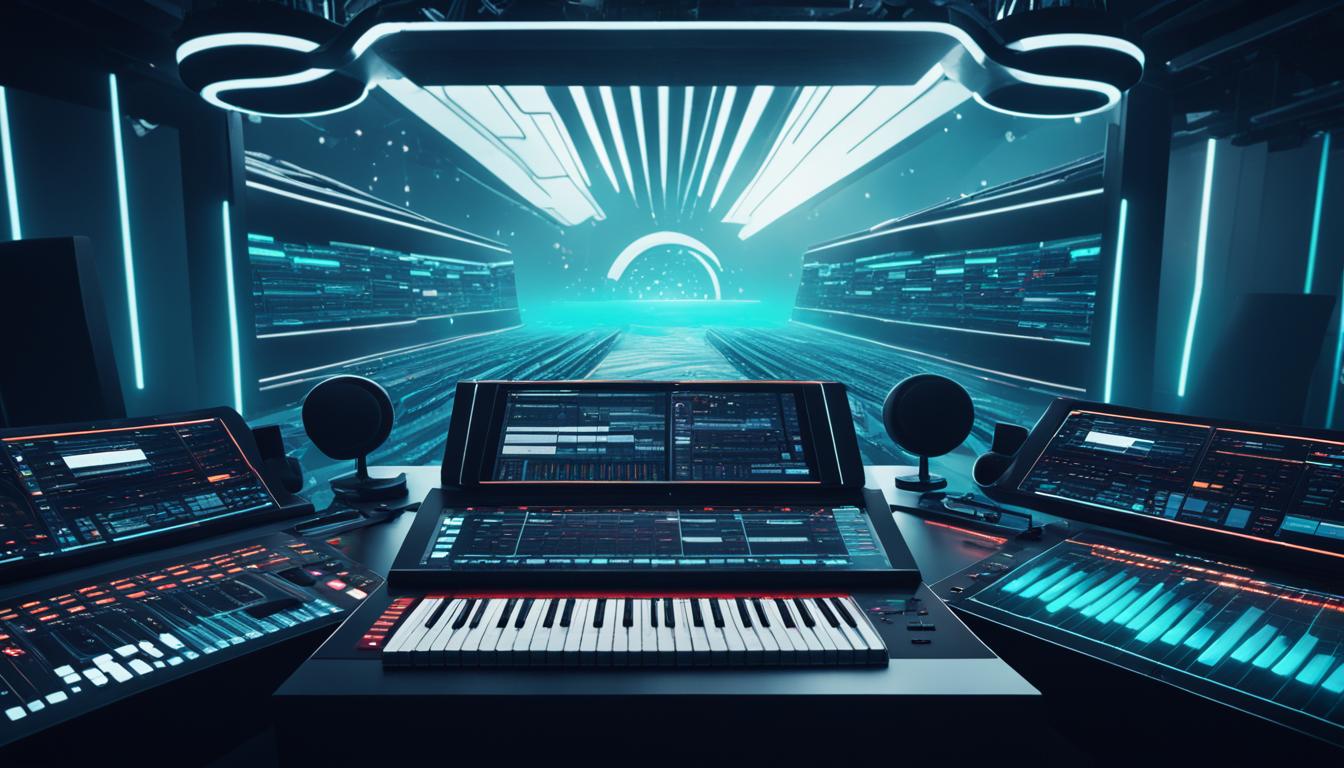Welcome to the age of Web 3.0, where technology is transforming every aspect of our lives, including the music industry. The advent of Web 3.0 is ushering in a new era of innovation, creativity, and connectivity in the music world. From revolutionizing music streaming to leveraging blockchain technology, artificial intelligence, decentralized platforms, smart contracts, and non-fungible tokens (NFTs), Web 3.0 is reshaping how music is created, distributed, and consumed.
From a secure and transparent music ecosystem powered by blockchain technology to AI-generated compositions and personalized music recommendations, the possibilities are endless. Artists now have more control over their music and can directly engage with their fans through decentralized platforms. Smart contracts and NFTs are revolutionizing royalty distribution and creating new monetization opportunities.
This digital transformation in the music sector signifies a monumental shift in the way music is experienced. As we delve deeper into the impact of Web 3.0 on the music industry, let’s explore how these technological advancements are shaping the future of music and opening up new horizons for artists and fans alike.
Key Takeaways:
- Web 3.0 is revolutionizing the music industry through the integration of blockchain technology, AI, decentralized platforms, smart contracts, and NFTs.
- Music streaming platforms are becoming more secure and transparent with the help of blockchain technology.
- AI is playing a vital role in music creation, from composing unique music to providing personalized recommendations.
- Decentralized music platforms are empowering artists and fostering direct connections with fans.
- Smart contracts and NFTs are transforming royalty distribution and enabling the monetization of unique digital assets.
The Impact of Blockchain Technology in Music
Blockchain technology is revolutionizing the music industry, providing solutions to long-standing challenges and transforming the way music is created, distributed, and monetized. One of the most significant impacts of blockchain in the music industry is the introduction of transparent music royalties. With blockchain, artists can now receive fair and transparent compensation for their work, ensuring that they are properly rewarded for their creative efforts.
By recording each transaction on the blockchain, the flow of royalties becomes easily traceable, eliminating the opacity and inefficiencies that have plagued the traditional music industry. This transparency ensures that artists receive their rightful share of revenue, fostering trust and accountability between artists, distributors, and consumers.
Another game-changing aspect of blockchain technology in music is the facilitation of decentralized music distribution. Traditionally, artists have relied on centralized streaming platforms to reach their audience, often facing challenges such as limited control over their music and reduced revenue due to intermediaries.
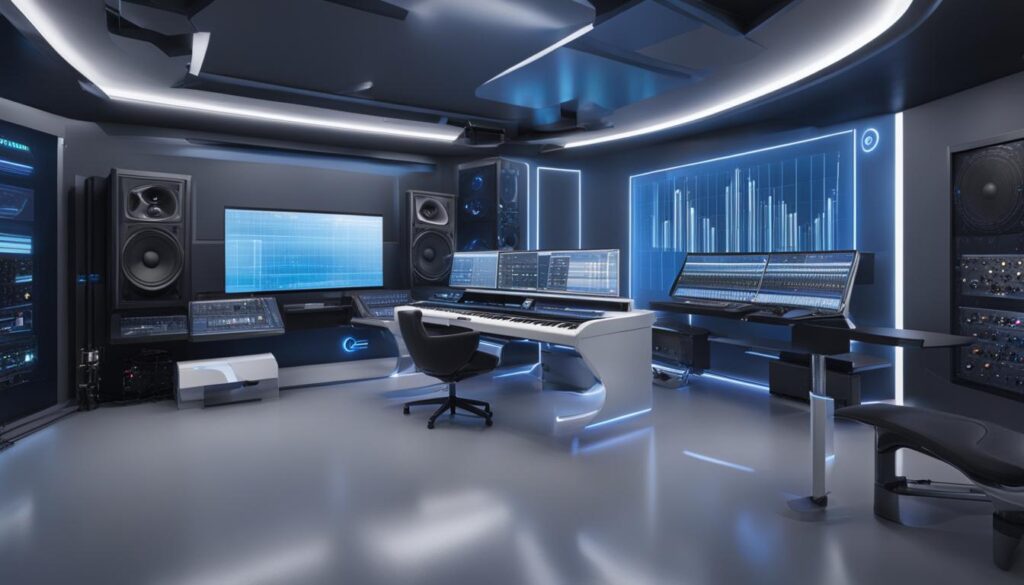
However, with blockchain, artists can now directly distribute their music to fans without relying on middlemen, creating a more direct and transparent connection between artists and their audience. This decentralized approach empowers artists to have more control over their creative work and ensures that more revenue finds its way back to the artists themselves.
Furthermore, blockchain technology has the potential to address the long-standing issue of piracy in the music industry. By creating a secure and immutable record of ownership and copyright, blockchain can help prevent unauthorized copying, distribution, and piracy of music.
“Blockchain technology has the potential to transform the music industry by enabling transparent music royalties, decentralized music distribution, and piracy prevention.” – Music Industry Expert
By leveraging blockchain technology in the music industry, artists can not only protect their intellectual property but also receive fair compensation for their creative endeavors. This shift towards transparency and fairness in the music industry is empowering artists and fostering a more sustainable and equitable ecosystem.
Benefits of Blockchain Technology in the Music Industry:
- Transparent music royalties, ensuring fair compensation for artists.
- Decentralized music distribution, allowing artists to directly connect with fans.
- Piracy prevention, safeguarding the rights and revenue of musicians.
By embracing blockchain technology, the music industry is embracing a future where artists have greater control, transparency, and monetary rewards for their contributions.
The Role of AI in Music Creation
AI is revolutionizing the music industry by harnessing its power in music creation, providing personalized experiences for listeners, and empowering artists with innovative tools. Let’s explore the impact of AI in detail.
Music Composition Algorithms
AI-powered music composition algorithms are changing the way music is created. By analyzing vast amounts of data, these algorithms recognize patterns and generate unique compositions that resonate with listeners. Artists can leverage these algorithms to explore new creative territories, experiment with different styles, and push the boundaries of musical expression.
“AI-driven music composition algorithms have opened up endless possibilities for artists to explore new sounds and styles. The ability to generate music that is both innovative and emotionally captivating is truly remarkable.”
Personalized Music Recommendations
Music recommendation systems powered by AI have transformed the way we discover and enjoy music. By analyzing individual preferences and listening habits, these systems provide personalized suggestions that cater to each listener’s unique taste. This personalized approach enhances the overall music discovery and listening experience, allowing listeners to constantly explore new genres and artists.
“Thanks to AI-powered music recommendations, I’ve discovered so many incredible artists that perfectly match my musical taste. It feels like having a personal DJ who knows exactly what I love to listen to.”
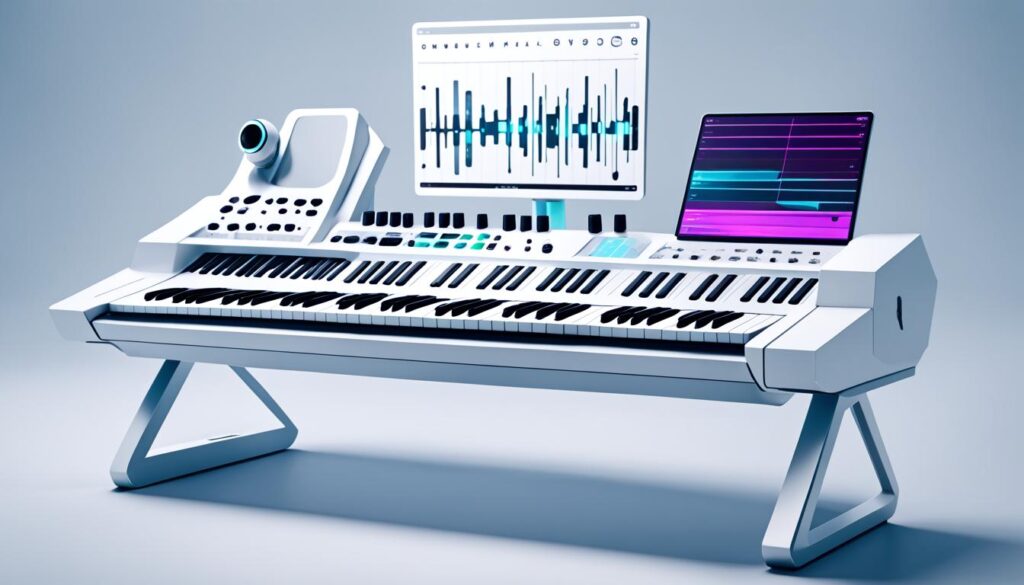
AI in music creation and personalized music recommendations are revolutionizing the way we interact with music. Artists can leverage these technologies to enhance their creative process and connect with their audience on a deeper level. Listeners, on the other hand, enjoy a more immersive and personalized music experience, constantly discovering new gems in the vast musical landscape.
Decentralized Music Platforms and Direct Artist-Fan Connections
Decentralized music platforms have emerged as a powerful force in the music industry, transforming the way artists connect with their fans and distribute their music. These innovative platforms eliminate intermediaries, enabling artists to have more control over their creative work and directly engage with their fan base.
With decentralized music platforms, artists can establish direct connections with their fans, fostering a stronger relationship and building a dedicated community. This direct artist-fan engagement allows for a more personalized and intimate experience, creating a sense of belonging and loyalty among fans.
Furthermore, decentralized platforms embrace a community-driven approach, where fans actively participate and have a say in the music production process. This collaborative environment empowers fans to influence artists’ creative decisions, making them an integral part of the music-making journey.
By involving fans directly in the artistic process, artists gain valuable insights and feedback, enabling them to better understand their audience’s preferences and deliver music that resonates deeply. This deep connection strengthens the artist-fan relationship and creates a sense of co-creation within the music community.
“Decentralized music platforms bridge the gap between artists and fans, fostering a sense of collaboration and shared passion for music. These platforms are revolutionizing the way music is created, consumed, and celebrated.”
Advantages of Decentralized Music Platforms:
- Direct artist-fan connections and engagement
- Empowerment of artists through increased control over their music
- Community-driven music production process
- Valuable insights and feedback from fans
- A more intimate and immersive fan experience
Decentralized music platforms are shaking up the traditional music industry model, paving the way for a more inclusive, collaborative, and artist-centric music ecosystem.
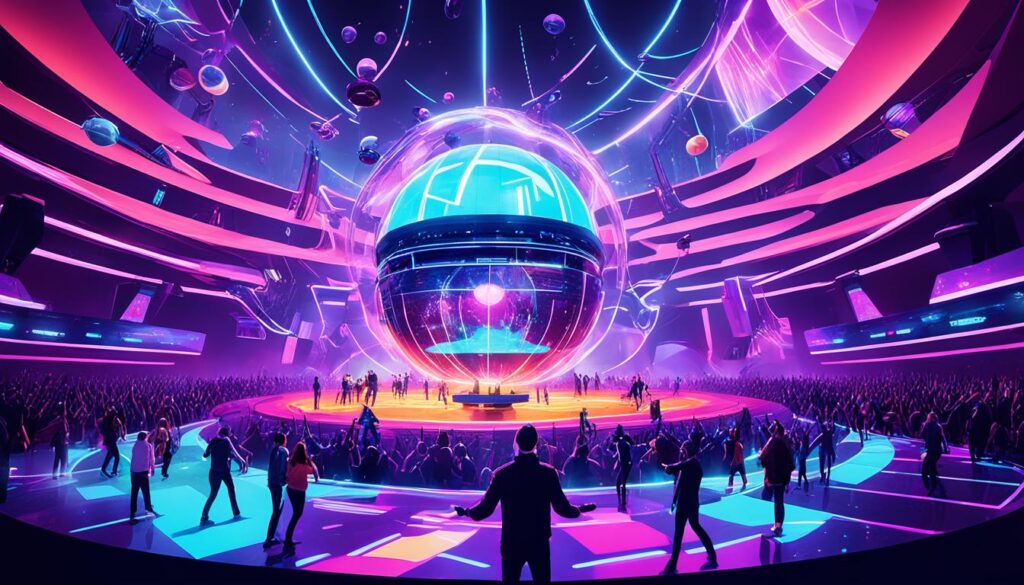
| Decentralized Music Platforms | Traditional Music Industry Model |
|---|---|
| Direct artist-fan connections and engagement | Artists rely on intermediaries for fan interactions |
| Community-driven music production process | Artists have limited input from fans |
| Increased control over music distribution | Artists depend on record labels and streaming platforms for distribution |
| Valuable insights and feedback from fans | Artists have limited access to fan opinions |
| A more inclusive and collaborative music ecosystem | Music industry decisions are primarily driven by executives and industry gatekeepers |
Smart Contracts and NFTs in the Music Industry
Smart contracts and NFTs (non-fungible tokens) are revolutionizing the music industry, bringing transparency and new opportunities for artists and fans alike. With the use of smart contracts, royalty distribution in the music industry becomes automated and transparent, ensuring that artists receive their fair share of revenue. By eliminating complex intermediaries, smart contracts streamline the process and empower artists to have more control over their earnings.
On the other hand, NFTs offer a unique way for artists to monetize their music and create exclusive digital assets. With NFTs, artists can tokenize their music, selling it as one-of-a-kind digital assets that fans can own. This opens up new revenue streams for artists while providing fans with the opportunity to own a piece of music history.
Through smart contracts and NFTs, the music industry is experiencing a new era of transparency, accountability, and creative possibilities. Artists can ensure that their work is properly compensated, and fans can engage with music in a more immersive and interactive way.
“Smart contracts and NFTs are reshaping the music industry, empowering artists to take control of their music and establish direct connections with their audience. It’s an exciting time for both artists and music enthusiasts.”
Benefits of Smart Contracts and NFTs in the Music Industry
The integration of smart contracts and NFTs in the music industry brings forth several notable benefits:
- Transparency and fairness: Smart contracts ensure that royalty distribution is transparent and automated, eliminating the need for intermediaries and ensuring artists receive fair compensation.
- Secure ownership: NFTs provide a secure and verifiable record of ownership, allowing artists to monetize their music and fans to own exclusive digital assets.
- New revenue streams: NFTs enable artists to tap into new revenue streams by offering unique digital assets and memorabilia.
- Direct artist-fan engagement: Smart contracts and NFTs create opportunities for artists to directly engage with their fans, fostering a stronger and more intimate relationship.
With the continuous development of smart contracts and NFTs, the music industry is embracing a digital transformation that empowers artists, transforms fan experiences, and shapes a more transparent and innovative ecosystem.
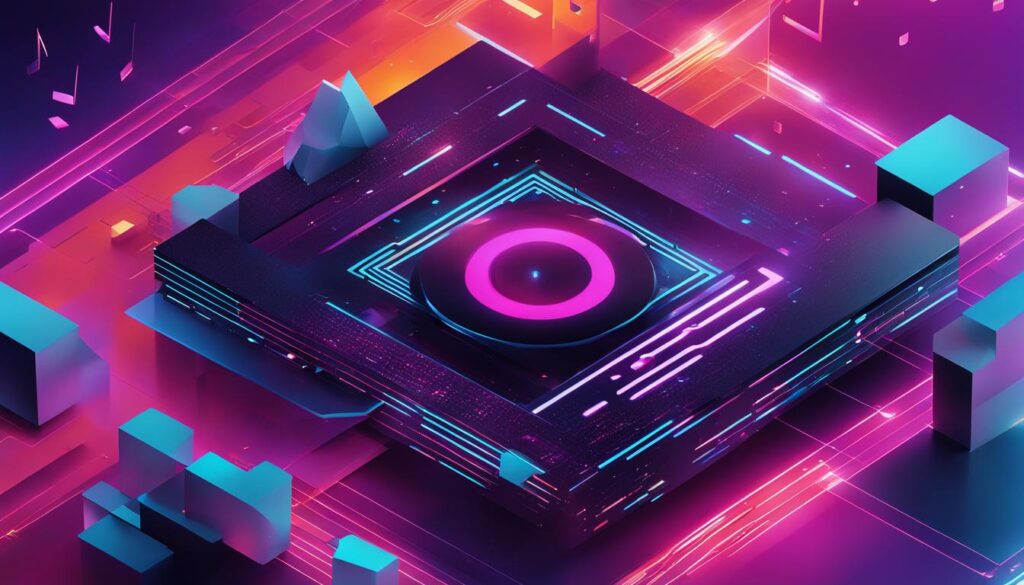
The Digital Transformation in the Music Sector
The music industry is undergoing a profound digital transformation that is revolutionizing the way music is created, distributed, and consumed. Thanks to technological advancements and the rise of streaming platforms, online music consumption has reached unprecedented levels, granting users access to a vast library of music anytime and anywhere.
Technologies such as Web 3.0, blockchain, AI, and decentralized platforms are the driving forces behind this digital revolution. Artists and industry professionals are embracing these innovations to adapt to the changing landscape. They are exploring new revenue streams, connecting with fans in innovative ways, and embracing the opportunities brought by the digital era.
The digital transformation of the music sector has brought about greater accessibility, creativity, and connectivity. Through streaming platforms, music lovers can explore a virtually endless catalog of songs from various artists and genres. This accessibility has empowered listeners to discover and enjoy music in ways that were unimaginable in the past.
Furthermore, technological advancements have opened up new avenues for creativity in the music industry. AI-powered technologies are aiding artists in the creative process by generating music compositions and providing personalized music recommendations. These advancements enable artists to experiment with new sounds, styles, and collaborative approaches, pushing the boundaries of musical expression.
Decentralized platforms have also emerged, offering artists more control over their music and fostering direct connections with their fans. These platforms enable artists to engage with their audience on a deeper level, building dedicated communities around their music. Fans themselves can actively participate in the music creation process, providing valuable feedback and influencing artistic decisions.
All of these changes constitute a digital transformation that is reshaping the music sector as we know it. The industry is becoming increasingly dynamic, diverse, and connected. The opportunities for artists to be discovered, to create and distribute their music, and to engage with their fans have expanded exponentially.
Technological Advancements Driving the Digital Transformation
The digital transformation in the music sector is fueled by several key technological advancements:
- The rise of streaming platforms, enabling convenient and widespread online music consumption.
- The integration of Web 3.0 technologies, revolutionizing the way music is created, distributed, and monetized.
- The utilization of blockchain technology, ensuring transparent and fair royalty distribution for artists.
- The application of AI in music creation, enhancing creativity and personalizing the music listening experience.
- The emergence of decentralized platforms, empowering artists and giving them more control over their music.
These advancements are propelling the music industry into a new era, characterized by a digital-first approach, decentralized networks, and unprecedented opportunities for artists and music lovers alike.
“The digital transformation is reshaping the music industry, allowing artists to reach a global audience and connect with fans on a more personal level. Technology has opened doors for creative expression, revenue generation, and fan engagement that were previously unimaginable.” – Music Industry Expert
Conclusion
Web 3.0 is reshaping the music industry, empowering artists and revolutionizing the way music is created, distributed, and consumed. Through the integration of blockchain technology, AI, decentralized platforms, smart contracts, and NFTs, the music industry is undergoing a digital transformation that brings exciting opportunities and innovations.
Web 3.0’s impact on the music industry is seen through the introduction of transparent royalty distribution, where artists can receive fair compensation for their work. Decentralized platforms are eliminating intermediaries and enabling direct artist-fan connections, fostering a stronger relationship between the two. Additionally, AI-powered music creation tools and personalized recommendations enhance the music experience for listeners.
As the future of the music industry unfolds, we can expect more technology-driven innovations to redefine the music landscape. Web 3.0’s continued evolution will lead to a more inclusive and creative music industry. Artists will have greater control over their music, fans will enjoy more personalized experiences, and technological advancements will pave the way for new revenue streams and opportunities.
The music industry is on the brink of a new era, fueled by the transformative power of Web 3.0. Embracing these technological advancements will not only shape the future of music but also enhance the overall music experience for artists and fans alike.
FAQ
How is Web 3.0 transforming the music industry?
Web 3.0 is revolutionizing the music industry through advancements in blockchain technology, AI, decentralized platforms, smart contracts, and NFTs. These technologies are changing the way music is created, distributed, and consumed, providing new opportunities and enhancing transparency and connectivity.
What impact does blockchain technology have on the music industry?
Blockchain technology in the music industry is introducing transparent music royalties, decentralized music distribution, and piracy prevention. It enables artists to receive fair compensation for their work, directly distribute their music to fans, and secure their ownership rights and copyright.
How is AI involved in music creation?
AI plays a significant role in music creation by powering music composition algorithms and personalized music recommendation systems. It assists artists in generating music compositions and provides users with tailored music suggestions based on their preferences and listening habits.
What are decentralized music platforms, and how do they impact artist-fan connections?
Decentralized music platforms eliminate intermediaries and empower artists to directly connect with their fans. These platforms foster direct fan engagement, create a community-driven music ecosystem, and allow fans to influence artists’ creative decisions.
How do smart contracts and NFTs revolutionize the music industry?
Smart contracts automate transparent royalty distribution and ensure artists receive their fair share of revenue. NFTs enable artists to tokenize their music and sell it as unique digital assets, creating new revenue streams and allowing fans to own exclusive pieces of music or memorabilia.
What is the digital transformation in the music sector?
The digital transformation in the music sector refers to the adoption of technology-driven innovations, including Web 3.0, online music consumption, streaming platforms, and technological advancements. It is reshaping the way music is created, consumed, and monetized, offering greater accessibility, creativity, and connectivity.
What is the future of the music industry in the context of Web 3.0?
The future of the music industry will be shaped by technology-driven innovations, such as Web 3.0. It will empower artists, redefine the way music is created, consumed, and monetized, and open up new opportunities for both artists and music listeners.

